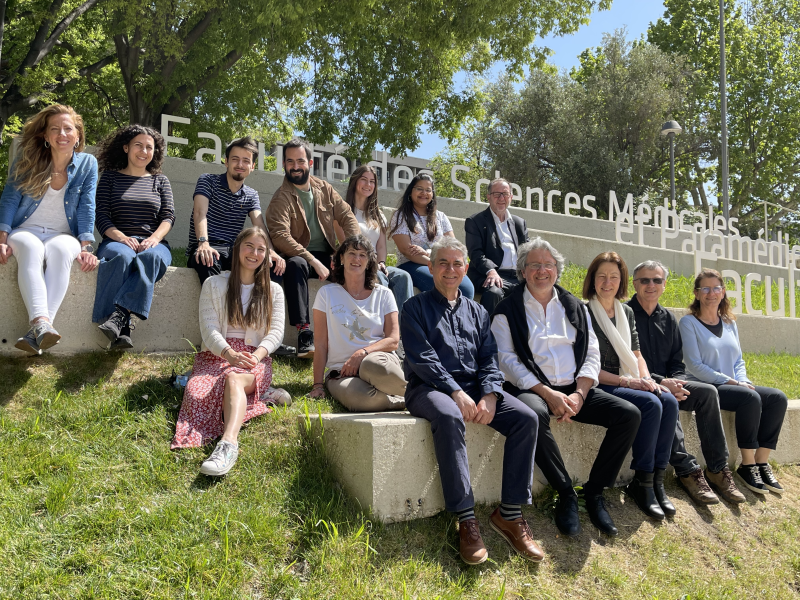Description:
We study the pathophysiological mechanisms that operate in Alzheimer’s disease under the scope of neuroinflammation, amyloidogenesis and synaptic dysfunctions. Understanding and fighting neurodegenerative diseases, in particular Alzheimer’s disease, is one of the most challenging endeavors of modern neuroscience. Alzheimer’s disease is the most devastating neurodegenerative disorder with a major socio-economic burden that is accentuated by the absence of effective treatments curing or slowing down its progression. Despite a variety of therapies currently under investigation, the discovery of a cure does not seem to be within reach at this point. Therefore, there is an urge in identifying new targets in the triggering/progression of the disease and understanding the underlying molecular mechanisms preceding irreversible cognitive decline. In this context, our global objective is to better understand some of the proteolytic pathways that operate at the crossroads of three major pathogenic processes tightly interconnected: neuroinflammation, amyloidogenesis and synaptic dysfunctions. Our original findings have placed some matrix metalloproteinases (MMPs) as new actors in Alzheimer’s pathogenesis because they promote neuroinflammation and amyloidogenesis, and alter synaptic transmission as well. Consequently, MMPs may become potential new therapeutic targets. The backbone of our research is therefore structured around two main objectives: i) to increase our understanding of the pathophysiological mechanisms of Alzheimer’s disease, and ii) to develop and validate innovative therapeutic strategies on the basis of newly discovered targets. We use techniques of molecular and cellular biology, biochemistry, cell and tissue imaging, pharmacology, electrophysiology and animal behavior, on in vivo andin cellulo models of the pathology, in collaboration with INP teams and worldwide.
Public Summary:
Our research has a twofold objective: i) to better understand why and how our brain “degenerates” with age and especially in Alzheimer's disease ii) to put in place strategies to counteract this degenerative process. With aging, our brain becomes a little rusty and we are less efficient in performing tasks that were previously easy. These functional deficits, exacerbated in Alzheimer's disease, gradually lead us on the path of dementia. Aging is certainly a major risk for Alzheimer's disease, but why some people suffer from Alzheimer's while others manage to escape it remains a fundamentally unresolved issue in most cases. Indeed, a small percentage of cases (~1%) is the consequence of well-known mutations in three genes. People carrying one of these mutations are surely subject to familial (or hereditary) forms of disease, which often appear between 40 and 60 years of age. The vast majority of cases are said to be sporadic, for which the cause, or rather the causes, are not known. In addition to aging, other risk factors likely contribute to sporadic Alzheimer's disease, including co-morbidity with other diseases (brain injury, epilepsy, ischemia, diabetes), sex, nutrition, life style, inflammation, infections, and certainly some genetic predisposition. It is therefore increasingly recognized that Alzheimer's disease results from a combination of these factors and that only one of them could not bear entire responsibility.
In spite of recent indisputable advances on the knowledge of the biological bases of the disease, we still do not have treatments to prevent it, to slow it down or to stop it. Without treatment, the current number of 40 million patients is expected to triple by 2050, leading to an unprecedented health, economic and social crisis. These figures also provide a measure of the Herculean effort of research and the urgency of the task to be accomplished in the years to come in order to refute these gloomy estimates. Our team's contribution to this research effort is based on the original discovery that proteins generated by the brain, known as MT-MMPs, contribute to pathogenic processes and cognitive decline in animal models of the disease. As a result, we believe that MT-MMPs are potential new therapeutic targets in Alzheimer's disease. In order to consolidate this idea, our research advances on two fronts: i) we seek to better understand by which mechanisms these MT-MMPs contribute to the degeneration of our nerve cells. To this end, we use a range of state of the art techniques, as well as experimental models involving mice and pluripotent-induced stem cells (iPS) from patients with Alzheimer's disease; ii) we seek to identify chemical or natural molecules capable of modulating the pathogenic actions of MT-MMPs. We hope to add a new brick to the fight against this devastating disease affecting patients and their families, as well as our entire society. We hope that the knowledge gained from this work will also open avenues for research on other neurodegenerative diseases in which MT-MMPs would also be involved.












